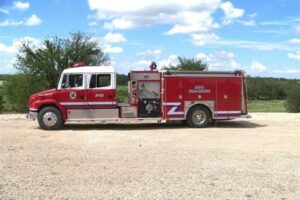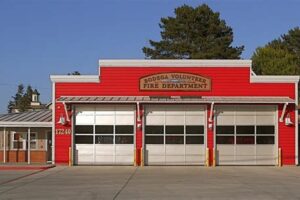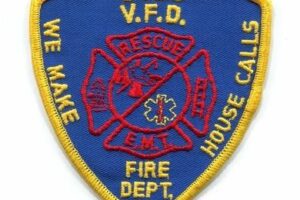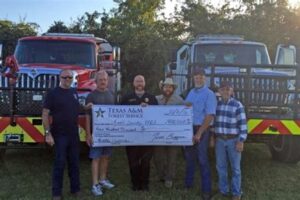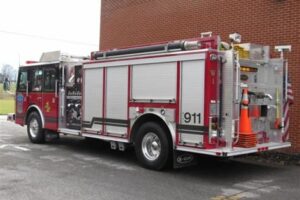Table of Contents
Interested in becoming a volunteer firefighter? Learn about the requirements to join a fire department as a volunteer. Discover the necessary qualifications, training programs, and commitment needed to serve your community as a dedicated fire department volunteer.
Are you looking for a way to give back to your community and make a real difference in the lives of others? If so, have you ever considered becoming a volunteer firefighter? Joining the fire department as a volunteer is not only a noble pursuit but also an opportunity to gain valuable skills and experiences that can last a lifetime. However, before you rush to sign up, it’s important to understand the requirements and qualifications that are expected of fire department volunteers. From physical fitness to a strong sense of teamwork, let’s explore the essential qualities that make someone an ideal candidate for this demanding yet immensely rewarding role.
Introduction
Volunteering for the fire department is a noble and selfless act that requires individuals to possess certain skills and meet specific requirements. These requirements are put in place to ensure the safety and effectiveness of the volunteer firefighters, as well as the communities they serve. If you are considering becoming a fire department volunteer, it is important to understand these requirements and assess whether you possess the necessary qualities to join this esteemed group of individuals.
Physical Fitness
One of the most crucial requirements for becoming a fire department volunteer is maintaining a high level of physical fitness. Firefighting tasks can be physically demanding, requiring individuals to carry heavy equipment, climb ladders, and perform strenuous rescue operations. Volunteers must pass a physical fitness test to demonstrate their ability to handle these challenges without endangering themselves or others.
Age Restrictions
Fire department volunteer requirements often include age restrictions. While these requirements vary depending on the jurisdiction, most departments require volunteers to be at least 18 years old. In some cases, younger individuals may be eligible to join junior firefighter programs, which offer training and experience to those under the age of 18.
Background Check
As with any position that involves public safety, fire department volunteers must undergo a thorough background check. This check ensures that individuals with criminal records or a history of violence are not entrusted with the responsibilities of a firefighter. Background checks typically include criminal record searches, employment history verification, and character references.
Driver’s License
A valid driver’s license is often a requirement for fire department volunteers. This is because volunteers may be required to drive fire trucks or emergency response vehicles during their service. Volunteers must possess a clean driving record and may need to acquire additional certifications, such as a commercial driver’s license (CDL), depending on the specific duties they will be assigned.
Residency
Many fire departments require volunteers to reside within the jurisdiction they serve. This ensures that volunteers are readily available in case of emergencies and allows them to become familiar with the specific needs and layout of their community. Proof of residency, such as a utility bill or lease agreement, may be required during the application process.
Medical Examination
Firefighting can be physically demanding and hazardous, which is why fire department volunteers are often required to undergo a medical examination. This examination assesses an individual’s overall health, ensuring they are fit to perform the duties of a firefighter. It may include physical assessments, blood tests, and evaluations of cardiovascular endurance.
Training and Certifications
Fire department volunteers must complete extensive training to develop the necessary skills and knowledge for firefighting and rescue operations. This training often includes classroom instruction, hands-on drills, and simulations. Additionally, volunteers may need to obtain certifications in areas such as basic life support (BLS) and hazardous materials handling.
Availability and Commitment
Volunteering for the fire department requires a significant commitment of time and availability. Emergencies can happen at any hour, so volunteers must be prepared to respond to calls during evenings, weekends, and holidays. Additionally, volunteers are often expected to attend regular training sessions and meetings to maintain their skills and stay up-to-date with department protocols.
Teamwork and Communication Skills
Firefighting is a team effort, and effective teamwork and communication are vital for the safety and success of every operation. Fire department volunteers must possess strong interpersonal skills, be able to work well in high-stress situations, and communicate effectively with their fellow firefighters and other emergency personnel.
Passion for Public Service
Above all, fire department volunteers must have a genuine passion for public service and a desire to make a positive impact in their community. The role of a firefighter is not just about extinguishing fires; it involves protecting lives, providing assistance during emergencies, and offering support to those in need. Volunteers must possess the compassion and dedication necessary to fulfill these responsibilities with unwavering commitment.
Conclusion
Becoming a fire department volunteer requires individuals to meet specific requirements and possess certain qualities. From physical fitness and a clean background check to training and a genuine passion for public service, these requirements ensure that volunteer firefighters are capable of handling the demands and challenges they may face. If you believe you possess these qualities, volunteering for the fire department can be an incredibly rewarding and noble endeavor.
Fire Department Volunteer Requirements: Ensuring Commitment to Community Safety
In today’s fast-paced and unpredictable world, the role of fire departments in ensuring community safety is more crucial than ever. These brave men and women put their lives on the line to protect our neighborhoods, homes, and loved ones from the ravages of fire. To maintain a team of dedicated and capable volunteers, fire departments have established a set of requirements that guarantee physical fitness, trustworthiness, and a commitment to continuous learning. Let’s delve into the various aspects of fire department volunteer requirements, ensuring that only the most qualified individuals are entrusted with safeguarding our communities.
1. Age Restrictions: Upholding a Minimum and Maximum Age for Volunteers
One of the primary considerations when selecting fire department volunteers is their age. While exact requirements may vary between departments, a common practice is to set a minimum age of 18 or 21, depending on the jurisdiction. This ensures that potential volunteers possess the physical capabilities and maturity level necessary to handle the challenges and responsibilities of firefighting. Furthermore, fire departments often impose an upper age limit to ensure efficient fitness levels, as firefighting demands endurance, agility, and quick decision-making.
2. Physical Fitness: Meeting Demanding Physical Standards
Firefighting is an inherently physically demanding profession. Volunteers must undergo rigorous medical examinations to ensure they meet the physical fitness requirements set by the fire department. These assessments evaluate their overall health, strength, and cardiovascular endurance. It is essential for volunteers to demonstrate their ability to handle the demanding physical challenges posed by firefighting, such as operating heavy equipment, managing intense heat, and executing rescue operations with agility and precision.
3. Background Checks: Ensuring Trustworthiness and Accountability
Given the sensitive and potentially dangerous nature of the work performed by fire department volunteers, trustworthiness and accountability are paramount. As part of the volunteer requirements, fire departments conduct thorough background checks on potential recruits. These checks aim to uncover any criminal record and ensure that volunteers have no history that may compromise their ability to serve the community effectively. Background checks may also include reference checks from employers or personal acquaintances, providing valuable insights into an applicant’s character and reliability.
4. Driver’s License: Possessing a Valid License and Clean Driving Record
Emergency response often involves operating emergency vehicles to quickly reach the scene of a fire or other incident. Therefore, possessing a valid driver’s license is a crucial requirement for volunteers interested in assisting the fire department. Additionally, a clean driving record free of major violations is usually necessary to guarantee responsible driving habits during emergencies. This requirement ensures that volunteers can safely navigate the roads while responding to calls, minimizing the risk of accidents and delays.
5. Attendance at Training Programs: Commitment to Continuous Learning
Firefighting is an ever-evolving field, with new techniques, technologies, and best practices emerging regularly. To ensure that volunteers remain equipped with the necessary knowledge and skills to handle emergency situations effectively, fire departments require attendance at training programs. These programs cover a wide range of topics, including firefighting techniques, CPR certification, first aid, and hazardous materials training. By promoting continuous learning and fostering a culture of professional development, fire departments ensure that their volunteers are always prepared to face any challenge.
6. Residency Proximity: Living within Close Vicinity of the Fire Department
When it comes to emergency response, every second counts. To ensure timely arrival at the scene of an incident, many fire departments require volunteers to reside within close proximity of the department’s jurisdiction. This residency requirement guarantees that volunteers can readily report to the station when needed, minimizing response delays and maximizing community safety. By having volunteers who live nearby, fire departments can ensure a swift and effective response to emergencies, ultimately saving lives and protecting property.
7. Drug Testing: Upholding a Drug-Free Environment
In order to maintain a safe and reliable work environment, fire departments frequently require volunteers to undergo regular drug screenings. By ensuring that volunteers abstain from drug use, fire departments can maintain a team free from impaired judgment and reduce the risk of accidents during emergency response operations. A drug-free environment ensures that volunteers can perform their duties with clarity, focus, and the utmost professionalism, guaranteeing the safety of both themselves and those they serve.
8. Personal and Professional Reference Checks: Ensuring Character and Reliability
The inclusion of personal and professional reference checks in the volunteer requirements allows fire departments to assess the character, work ethic, and reliability of potential volunteers. By gathering insights from those who have interacted with applicants professionally or personally, fire departments can select volunteers who demonstrate the necessary qualities and commitment to serve their community faithfully. These reference checks provide valuable information about an applicant’s past experiences, attitudes, and interpersonal skills, enabling fire departments to build a cohesive and dependable team.
Fire department volunteer requirements are designed to ensure that only the most qualified individuals are entrusted with the responsibility of safeguarding our communities. By upholding age restrictions, physical fitness standards, background checks, driver’s license requirements, training program attendance, residency proximity, drug testing, and personal and professional reference checks, fire departments guarantee that their volunteers possess the necessary attributes and commitment to community safety. With these stringent requirements in place, fire departments can continue to provide exceptional service and protect lives and property from the devastating effects of fire.
The Fire Department Volunteer Requirements can vary from one jurisdiction to another, but they generally entail a set of standards that individuals must meet in order to serve as a volunteer firefighter. These requirements are put in place to ensure that volunteers possess the necessary skills, knowledge, and physical ability to respond effectively to emergency situations. Here is an overview of some common volunteer requirements:
1. Minimum Age: Most fire departments require volunteers to be at least 18 years old. This age restriction ensures that volunteers have reached a level of maturity and responsibility necessary to handle the demands of the role.
2. Physical Fitness: Firefighting is physically demanding, so volunteers must be in good health and physical condition. They may be required to pass a physical fitness test, which assesses their strength, stamina, and agility. Maintaining a certain level of fitness is crucial for firefighters to perform their duties safely and effectively.
3. Medical Examination: Volunteers are often required to undergo a medical examination to ensure they are free from any medical conditions that could hinder their ability to perform firefighting tasks. This examination may include tests for cardiovascular health, respiratory function, and overall physical wellness.
4. Background Check: Fire departments typically conduct background checks on potential volunteers to verify their criminal history. This is done to ensure the safety and security of the community and fellow firefighters. Certain criminal convictions may disqualify individuals from volunteering.
5. Driver’s License: Many fire departments require volunteers to possess a valid driver’s license. This is important as volunteers may be tasked with driving fire trucks or emergency response vehicles to the scene of an incident.
6. Training: Volunteers are usually required to complete a comprehensive training program before they can actively participate in firefighting operations. This training covers firefighting techniques, equipment operation, hazardous materials handling, and other essential skills. Ongoing training is often required to maintain proficiency and keep up with new developments in the field.
7. Commitment: Volunteering for a fire department requires a significant commitment of time and effort. Potential volunteers should be prepared to dedicate a certain number of hours per week or month to training, responding to emergencies, attending meetings, and participating in community outreach programs.
Overall, the requirements for becoming a volunteer firefighter are designed to ensure that individuals are well-prepared and capable of handling the challenges associated with firefighting. By establishing these standards, fire departments can maintain a high level of professionalism and effectiveness in their emergency response operations.
Thank you so much for taking the time to visit our blog and learn more about fire department volunteer requirements. We understand that you may have come here with a genuine interest in serving your community and making a difference, and we commend you for that. In this closing message, we would like to summarize the key points we have discussed throughout the article and encourage you to pursue this noble path.
First and foremost, it is important to highlight that becoming a volunteer firefighter is not an easy task. It requires dedication, commitment, and a strong desire to help others. However, the rewards that come with this role are immeasurable. By joining the fire department as a volunteer, you will become part of a tight-knit community that works together to protect and serve the public in times of emergency.
Transitioning into the requirements, one fundamental aspect is the physical fitness criteria. Firefighting is a demanding job that requires individuals to be in good physical shape. This includes passing certain physical tests, such as carrying heavy equipment, climbing ladders, and crawling through confined spaces. It is crucial to maintain a healthy lifestyle to ensure you can handle the physical demands of the role effectively.
Moreover, there are specific training and educational requirements that must be met. These vary from state to state and even within different fire departments. Most commonly, volunteers are required to complete a basic firefighting course, where they learn essential skills such as fire suppression techniques, first aid, and rescue operations. Additionally, ongoing training sessions and drills are conducted to ensure that volunteers are up-to-date with the latest procedures and techniques.
In conclusion, becoming a volunteer firefighter is a noble and rewarding endeavor. While the requirements may seem challenging, the sense of fulfillment and pride that comes with serving your community is truly unparalleled. We hope that this article has provided you with valuable insights into the fire department volunteer requirements and has sparked your interest in pursuing this path. We encourage you to reach out to your local fire department for further information and to embark on this incredible journey of making a difference in the lives of others.
Thank you once again for visiting our blog, and we wish you the best of luck in your future endeavors!
Video Fire Department Volunteer Requirements
People Also Ask About Fire Department Volunteer Requirements:
What are the qualifications to become a volunteer firefighter?
- Being at least 18 years old
- Having a high school diploma or equivalent
- Maintaining a valid driver’s license
- Possessing good physical fitness
- Passing a background check and drug screening
- Completing basic firefighter training courses
Are there any specific physical requirements to become a volunteer firefighter?
- Being able to lift and carry heavy equipment
- Having good vision and hearing
- Maintaining overall physical strength and stamina
- Being free from any medical conditions that could hinder firefighting tasks
Do I need prior experience to volunteer at a fire department?
How much time commitment is expected from volunteer firefighters?
Are there any age restrictions for becoming a volunteer firefighter?
Volunteer firefighter requirements vary depending on the fire department, but generally, the qualifications include:
Yes, volunteer firefighters are usually required to meet certain physical standards to ensure they can perform their duties effectively. These requirements may include:
No, prior experience is not always necessary to become a volunteer firefighter. Many fire departments provide comprehensive training programs to equip volunteers with the required skills and knowledge. However, having previous experience or certifications in emergency medical services (EMS) or firefighting can be advantageous.
The time commitment expected from volunteer firefighters can vary depending on the fire department and the individual’s availability. Some departments may require a specific number of hours per month, while others may have more flexible arrangements. It is important to inquire about the time commitment during the application process.
While the minimum age requirement to become a volunteer firefighter is typically 18 years old, some fire departments offer junior firefighter programs for individuals between the ages of 16 and 18. These programs allow younger individuals to gain valuable experience and knowledge under the supervision of experienced firefighters.

